| Srl | Item |
| 1 |
ID:
108144


|
|
|
|
|
| Publication |
2011.
|
| Summary/Abstract |
Like many states in the Global South, the Australian economy relies heavily on the natural resource sector for a large proportion of its export earnings. Four decades ago, this basic similarity eventually induced Australian governments to become 'fellow travellers' with the G77 quest for a new international economic order. When that quest was put to rest by the rise of neo-liberalism, Australian governments then became fervent believers in free rather than managed trade; but in the contemporary era where neo-liberalism is now a dying policy creed, Australia's current resource boom begs the question of whether the time is now ripe for Canberra to reinvent this role. What the rationales might be for that 'back to the future' policy move is explored in the context of Australia's iron ore trade with China.
|
|
|
|
|
|
|
|
|
|
|
|
|
|
|
|
| 2 |
ID:
155429
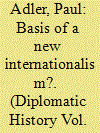

|
|
|
|
|
| Summary/Abstract |
This article examines the thought and activism of the Institute for Policy Studies (IPS), a progressive U.S. think tank. During the 1970s IPS worked to promote Third World development, first by backing calls for a New International Economic Order and then by opposing the neoliberal turn at the decade’s end.
|
|
|
|
|
|
|
|
|
|
|
|
|
|
|
|
| 3 |
ID:
120939
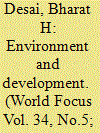

|
|
|
| 4 |
ID:
108145
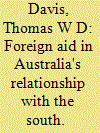

|
|
|
|
|
| Publication |
2011.
|
| Summary/Abstract |
In identifying the determinants of Australia's foreign aid relationship with developing countries (sometimes labelled 'the South'), this article examines the institutional history of official Australian development assistance since the Second World War. Several, often competing, narratives are delineated. These include: an ongoing questioning within the aid 'policy community', such as it is, of the purpose of foreign aid and the nature of its relationship to foreign policy; bureaucratic contestation over access to foreign aid resources; the desire of Australian foreign aid decision-makers to ensure their control, increasingly via managerialist methods, of aid delivery; and an avoidance by decision-makers of viewing the South as a politically relevant entity. Taken together, these narratives portray an aid programme that has become more 'professionalised' over time, but which finds itself institutionally inhibited from engaging meaningfully with the political nature of international development relationships.
|
|
|
|
|
|
|
|
|
|
|
|
|
|
|
|
| 5 |
ID:
123533
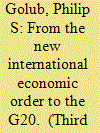

|
|
|
|
|
| Publication |
2013.
|
| Summary/Abstract |
In the early 1970s the G77 and the Non Aligned Movement ( nam ) challenged the material and intellectual pillars of the postwar liberal capitalist system through collective action at the UN to establish a New International Economic Order ( nieo ). The aim was to complete the 'emancipation' of the 'global South' by creating binding institutional frameworks, legal regimes and redistributive mechanisms correcting historically constructed core-periphery disparities. That ambitious effort failed in the face of 'Northern' resistance and national segmentation within the nam . Today re-emerging states of the global South are engaged in a more successful effort to gain voice and alter international hierarchy by claiming a central place in the world capitalist system and restructuring it from within. The vertical late-modern world system centred in the Atlantic and ordered by the 'West' is thus gradually giving way to a polycentric international structure in which new regional and transnational 'South-South' linkages are being formed. This paper critically reviews the transformation and argues that, while it is creating long sought-for conditions of relative international equality, it has also dampened the emancipatory promise of the anti-colonial struggle.
|
|
|
|
|
|
|
|
|
|
|
|
|
|
|
|
| 6 |
ID:
073329
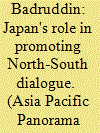

|
|
|
| 7 |
ID:
184978
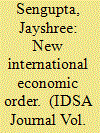

|
|
|
| 8 |
ID:
191025
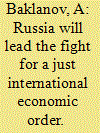

|
|
|
|
|
| Summary/Abstract |
THE new Foreign Policy Concept of the Russian Federation, approved by Russian President Vladimir Putin on March 31, 2023, explains the basic principles, strategic goals, and priority areas of Russia's foreign policy...
|
|
|
|
|
|
|
|
|
|
|
|
|
|
|
|